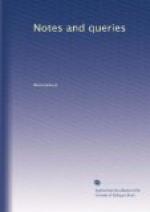Hogs not Pigs.—In Cowper’s humorous verses, “The yearly Distress, or Tithing-time at Stoke in Essex,” one of the grumblers talks
“of pigs that he has lost
By maggots at the tail.”
Upon this I have to remark that an intelligent grazier assures me that pigs are never subject to the evil here complained of, but that lambs of a year old, otherwise called “hogs” or “hoggets,” are often infested by it. It would appear, therefore, that the poet, misled by the ambiguous name, and himself knowing nothing of the matter but by report, attributed to pigs that which happens to the other kind of animal, viz. lambs a year old, which have not yet been shorn.
J. MN.
* * * * *
QUERIES.
A QUERY AND REPLIES.
Plaister or Paster—Christian Captives—Members for Calais, &c.—In editing Tyndale’s Pathway (Works, vol. i. p. 22.), I allowed preceding editors to induce me to print pastor, where the oldest authority had paster. As the following part of the sentence speaks of “suppling and suaging wounds,” I am inclined to suspect that “paster” might be an old way of spelling, “plaster.” Can any of your correspondents supply me with any instance in which “plaster” or “plaister” is spelt “paster” by any old English writer?
In return for troubling you with this question, you may inform Mr. Sansom, in answer to Query, Vol. ii., p. 41., that Hallam says, “Not less than fifty gentlemen were sold for slaves at Barbadoes, under Cromwell’s government.” (Constit. Hist., ch. x. note to p. 128., 4to. edit.) And though Walker exaggerated matters when he spoke “a project to sell some of the most eminent masters of colleges, &c., to the Turks for slaves,” Whitelock’s Memorials will inform him, under date of Sept. 21, 1648, that the English Parliament directed one of its committees “to take care for transporting the Scotch prisoners, in the first place to supply the plantations, and to send the rest to Venice.”
To another, O.P.Q. (Vol. ii., p. 9.), you may state that the members for Calais in the time of Edw. VI., and in the first four parliaments of Mary, may be seen in Willis’ Notitia Parliamentaria, where their names are placed next to the members for the Cinque Ports. Willis states that the return for Calais for the last parliament of Henry VIII is lost. Their names indicate that they were English,—such as Fowler, Massingberd, &c.
As to umbrellas, there are Oriental scholars who can inform your inquirers that the word “satrap” is traceable to words whose purport is, the bearer of an umbrella.
Another of your latest Querists may find the epigrams on George II.’s (not, as he imagines, Charles I.’s) different treatment of the two English universities in Knox’s Elegent Extracts. The lines he has cited are both from the same epigram, and, I think, from the first of the two. They were occasioned by George. II’s purchasing the library of Dr. Moore, Bishop of Ely, and giving it to the university of Cambridge.




